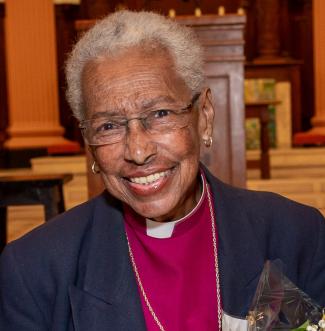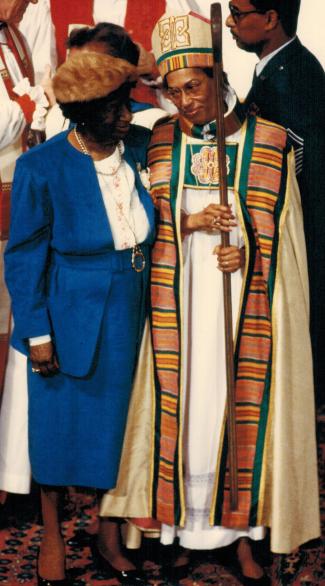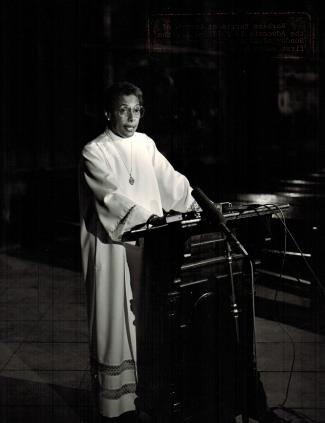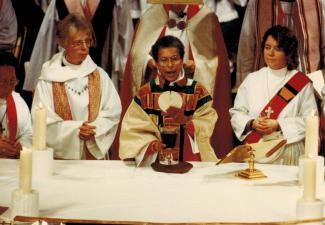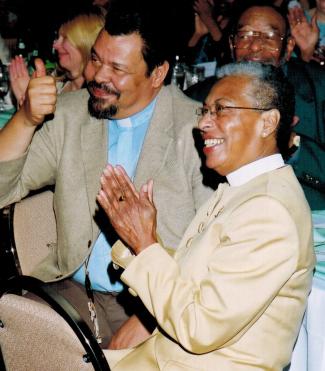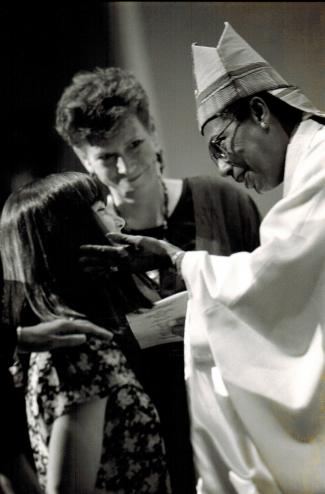It has been said that God's time and ours met on Feb. 11, 1989, when Barbara C. Harris became the first woman to be ordained a bishop in the worldwide Anglican Communion. On that day, while the world watched, a woman donned the symbolic regalia of the church's highest order for the first time—an African-American woman and one who had not followed the traditional path to the episcopacy.
As the first, Harris belonged, in a sense, to the whole church. With great grace, she honored her symbolic role while tirelessly serving the people of the Episcopal Diocese of Massachusetts as their suffragan (assisting) bishop for 13 years, until her retirement in 2002—all the while striving to be faithful to her calling, her church and her God.
Her years of episcopal leadership were filled with traveling and witnessing, preaching and teaching and administering the sacraments. A gifted storyteller known for her quick wit and raspy-voiced delivery, she was also a spirited and sought-after preacher of hymn-laced, Gospel-grounded sermons, and an outspoken advocate for, in her words, "the least, the lost and the left out."
In 2018, having reached the 30th anniversary of her consecration, she wrote a thank-you message to the people of the Diocese of Massachusetts in which she summed up her episcopacy by paraphrasing the words of the apostle Paul: “God chooses the foolish things of the world to confound the wise.”
Harris died on March 13, 2020, at Care Dimensions Hospice House in Lincoln following a hospitalization in Boston, faithfully attended throughout by close friends and upheld by the prayers of many. She was 89.
"Our hearts are truly heavy at the loss of one who has been a faithful and altogether irrepressible companion, pastor and inspiration to us in the Diocese of Massachusetts for 31 years. At the same time our hearts are truly buoyed by the hope which she preached and the conviction she embodied for us throughout all these years," the Rt. Rev. Alan M. Gates, Bishop of the Diocese of Massachusetts, said in an announcement to the diocesan community.
"Barbara once wrote, 'If we can believe that Jesus, who died, rose again from the dead,...then we can, in peace, give over those who have died—known and unknown—to a loving, compassionate and ever-merciful God who has prepared for us a better home than this Good Friday world.'
“With regret but with confidence, we entrust our beloved sister Barbara to that merciful and compassionate God, just as she invited us to do," Gates said.
The Most Rev. Michael B. Curry, Presiding Bishop and Primate of the Episcopal Church, said by e-mail, "Bishop Harris was not large of physical stature. In fact, the opposite. But she was larger than life. She was larger than life because she lived it fully with her God and with us. She did it by actually living the love of God that Jesus taught us about. She did it walking the lonesome valley of leadership, paving a way for so many of us whose way had been blocked. She did it lifting her voice for those who had no voice. She did it with a joke, a whispered word, a secret joy in spite of anything that got in her way, including death. No wonder she titled her memoir, 'Hallelujah, Anyhow!'"
Barbara Clementine Harris was born on June 12, 1930, in Philadelphia to Walter and Beatrice (Price) Harris. She grew up in Philadelphia’s historic Germantown. She was the middle child of three, between her older sister, Josephine, and her younger brother, Thomas.
"Middle children, especially left-handed middle children, tend to be fiercely independent, and so I think I fit that model," she recalled in a 1999 interview in the Diocese of Massachusetts' newspaper, The Episcopal Times. "I was always the one who took risks and dared to do adventurous things."
Most influential in her life, Harris often said, were the women in her family, particularly her mother, “Ms. Bea”; her maternal grandmother, Mary Sembley Price; and her maternal great-grandmother, Ida Brauner Sembley, known as Mom Sem, who had been born into slavery in Maryland in 1857 and lived in the Harris household until her death in 1938.
Harris attended public schools and graduated from the Philadelphia High School for Girls. She studied singing and piano, and her mother, herself an organist, took in laundry and ironing to pay for her daughter’s lessons.
As a teenager Harris wrote a column for one of the major black newspapers, The Pittsburgh Courier. "I used my press pass to go to events where I probably should not have been," she said, recalling, as an example, a civil rights rally featuring the performer and political activist Paul Robeson—“at a time when it was considered pretty taboo.”
Harris was active in the Civil Rights Movement of the 1960s, through the Episcopal Society for Cultural and Racial Unity (ESCRU), and the National Council of Churches’ Delta ministry, traveling in 1965 to Greenville, Miss., to help register black voters and taking part in the Selma to Montgomery march.
She attended the Charles Morris Price School of Advertising and Journalism and had been hired in 1949 by Joseph V. Baker Associates Inc., a black-owned national public relations firm headquartered in Philadelphia. She was president of the firm in 1968 when she joined the Sun Company (formerly Sun Oil) as a community relations consultant. She later was named manager of community and urban affairs and headed Sun's public relations department from 1973 until becoming a senior staff consultant at Sun's corporate headquarters in 1977.
Those who knew Harris only as a church figure were often surprised to learn about her life as a corporate executive and wondered about her path from there to ordination.
The Episcopal Church was an important part of her family life—starting at St. Barnabas Church in Germantown (later merged with St. Luke’s Church)—and Harris had an active lay ministry in Christian education, prison chaplaincy and leadership at parish, diocesan and churchwide levels before discerning a call to ordained ministry.
"The call to ordained ministry came late, and I resisted it," she said. Feeling unworthy of the call, she said she was helped when a friend told her: "God does not call those who are worthy. God makes worthy those whom God would call."
Though Harris would become known for her preaching, she refused to study it. She recalled, in the book In Conversation: Michael Curry and Barbara Harris: "I never took a course in homiletics, and I can remember specifically saying to my bishop when I was preparing for ordination, I said, 'I'm not going to study homiletics.' He said, 'Why not?' I said, ‘Because the gift of preaching has been given to me. I'm not going to let the Episcopal Church mess it up.’"
Her formation for ordination included coursework at Villanova University, the Urban Theology Unit in Sheffield, England, and the Pennsylvania Foundation for Pastoral Counseling. She was ordained in the Diocese of Pennsylvania by Bishop Lyman Ogilby, as a deacon in 1979 and as a priest, at age 50, in 1980, when the ordination of women had been officially recognized in the Episcopal Church for only four years.
"It was still difficult for a number of people to see women in the role of their parish priest. Some people saw us as a different kind of priest. Some people tried to see us not at all," Harris recalled.
She was fortunate, she said, to have begun her ordained ministry from her home parish, the Church of the Advocate, host in 1974 to the “irregular” ordinations of the Philadelphia 11—the first women to be ordained priests in the Episcopal Church. Harris was the crucifer at that service. In an interview for a documentary film about the Philadelphia 11, Harris recalled how the procession had to be cut short for safety reasons, despite her desire to lead it "like Joshua, seven times around the walls of Jericho."
Harris was priest-in-charge of St. Augustine of Hippo Church in Norristown, Penn., from 1980 to 1984. She also served as chaplain to the Philadelphia County prisons, and as counsel to industrial corporations on public policy issues and social concerns. In 1984, she was named executive director of the Episcopal Church Publishing Company and publisher of the social justice magazine The Witness. In 1988, she took on additional duties as interim rector of the Church of the Advocate.
"The Mitre Fits Just Fine" announced the front page of The Episcopal Times, following the historic proceedings on Feb. 11, 1989, when, before a congregation of 8,000 in Boston's Hynes Auditorium—and virtually the whole world via live television and international media coverage—Harris was made a bishop.
It was the climax to the months of church controversy and the media maelstrom that followed her Sept. 24, 1988, election. Questions about Harris's qualifications arose during the election process—she was divorced, she had not graduated from seminary and she had been a priest for just under 10 years—and though the questions had been dealt with, they still loomed large, some said at the time, because deeper objections to her race and gender could not be raised aloud in liberal Massachusetts.
Objections continued into the consent process, with the necessary approval by a majority of diocesan Standing Committees coming in just 10 days before the scheduled consecration service. As Harris herself said in a sermon delivered in Philadelphia just after her election: There would seem to be fresh winds blowing in the church, refreshing to some, frightening to others.
Harris recalled, in the 1999 Episcopal Times interview, that she herself could hardly believe what was happening.
"Even up to being nominated, and during the 'dog and pony shows' when all the nominees were meeting the delegates to the convention around the diocese, I was saying to myself, I am never going to see these people again in life, and so I can say exactly what is on my mind. Which I did. So the most surprised person in the world when the election took place was me."
In fact, just before the bishop suffragan nomination process began in the Diocese of Massachusetts, Harris gave a speech at a conference at Episcopal Divinity School, in Cambridge, Mass., in which she told the assembly that when they talked about women entering the episcopacy, they were talking about white women, because, Harris recalled, "they had the visibility and the magic 10 years in the ordained ministry. I eventually had to eat my words."
By all accounts the three-hour consecration liturgy was dramatic and magnificent, with processions of 1,200 dignitaries and members of the clergy; four choirs; two protesters who spoke out; thunderous ovations—the first when the crowd caught sight of the bishop-elect entering the auditorium; and the solemn laying on of hands, when some 60 consecrating bishops ordained her. That sacred moment was captured in a photo that hung on the wall of her office, alongside a framed picture of slave shackles broken open.
Harris said that three things stood out in her memories of her consecration day.
"I remember the sermon," preached by her mentor, the Rev. Paul Washington, the rector of the Church of the Advocate, "and I remember the glorious music."
And she remembered that, after administering Communion to the altar party and those in the front rows, she went to the special area where wheelchair users were seated. "I remember being embraced by people in that section," Harris said.
The first months for the first woman were a wild time. Before the consecration, she said, "I was besieged by media folk for interviews. I was flooded with mail, both positive and negative. There were death threats. I had my telephone number changed twice at home. But there was also a great outpouring of support from people whom I knew and had known for a long time and from people whom I had never met for whom the election was very meaningful."
After the consecration, speaking invitations poured in from around the world, more than she could honor. "We realized that being the first, I belonged to the whole church and to people all over, and so we had to balance my honoring that with being the suffragan bishop of Massachusetts," she said.
Though a seasoned traveler, Harris had lived in Philadelphia all her life, and never far from the family home. "Coming to a new city and starting a new work in a brand new place was very difficult," she said.
She survived by staying on the phone with friends and family. "My phone bill looked like the national debt. But then I had some good friends here who helped me adjust and helped ease my way, both people on the staff and in the community," she said, citing specifically the Rev. Canon Edward Rodman, the diocese's longtime canon missioner, now retired, and his assistant, the late Annmarie Smith-Marvel. "In fact, in the early days that I was here, when I was staying in a hotel, Ed Rodman would come to the hotel every morning and walk me to the office and walk me back in the evening. He wouldn't let me walk the streets of Boston by myself."
Harris was a music lover, with the graceful hands of a pianist. She knew by heart nearly every hymn in the row of hymnals shelved next her piano. She loved to tell and retell colorful stories about her life experiences, and she had an arsenal of good and not-so-good jokes always at the ready. Harris made people laugh. She made them think. Sometimes she made them mad.
She preached and worked continually for the eradication of racism, sexism and homophobia, and to help bring about the full inclusion of all people in the life and sacraments of the church.
Many remember the fiery sermon she gave at the Episcopal Church's General Convention in Anaheim in 2009 during a service sponsored by Integrity, an advocacy organization of lesbian, gay, bisexual and transgender Episcopalians.
She declared as boldly as Peter that God has no favorites; called the church's prior restraint on consecrating gay bishops a "false peace"; made clear distinctions between the sacred and the profane, what is sacrament and what is not; and, with the General Convention at that time still debating whether to allow marriage blessings for same-sex couples, she declared that the church should get out of the marrying business altogether and stick to administering holy blessing.
“If we can develop rites and blessings for fishing fleets and fisherfolk, and for hunts, hounds, horses and houses, including the room where the indoor plumbing is located, we should be able to allow clergy in the exercise of their pastoral ministry to adapt and to appropriate the pastoral office of the blessing of a civil marriage for use with all couples who seek the church’s support and God’s blessing in their marriages. Friends, yes we can do that,” she proclaimed.
“Indeed, God has no favorites,” she concluded to cheers and applause. “So to you, gay man, lesbian woman; you, bisexual person; you, transgender man or woman; you, straight person; all of us, the baptized: Let us honor the sacrament of our baptism and our baptismal covenant, the only covenant we need to remain faithful.”
Harris was a member of the Union of Black Episcopalians and a founding member and president of the Episcopal Urban Caucus. She represented the Episcopal Church on the board of the Prisoner Visitation and Support Committee and was a member of the church’s Standing Commission on Anglican and International Peace with Justice Concerns. She also served as a member of the Board of Trustees of Episcopal Divinity School.
She was the recipient of at least 17 honorary degrees from colleges, universities and theological schools. In 2007 she received a Wisdom Award from the National Visionary Leadership Project.
Still, despite all the honors and the high-profile events of her ministry, Harris would always say that the best moments of her years as bishop were those spent baptizing, confirming and receiving people into the church.
After her retirement, she served from 2003 until early 2007 as an assisting bishop in the Diocese of Washington (D.C.). She continued to volunteer and preach at the Cathedral Church of St. Paul in Boston during her retirement, even while continuing to be in demand worldwide as a preacher.
In 2003 the Diocese of Massachusetts dedicated its newly built Barbara C. Harris Camp and Conference Center in Greenfield, N.H., in her honor, and in November of 2019, the Absalom Jones Center for Racial Healing in the Diocese of Atlanta launched the Bishop Barbara C. Harris Justice Project, aimed at strengthening the church’s efforts to address social injustice.
Harris published two books, Hallelujah, Anyhow!, a memoir written with Kelly Brown Douglas (2018, Church Publishing, Inc.), and the sermon collection Parting Words: A Farewell Discourse (2003, Cowley Publications). She is also featured in In Conversation: Michael Curry and Barbara Harris, edited by Fredrica Harris Thompsett (2017, Church Publishing, Inc.).
Harris is survived by her brother, Thomas Harris, and his wife, Jennifer, of Homestead, Fla., and their family; and dear friends, including Dorothy Cousins and goddaughter Pat Cousins Smith of Philadelphia and their families.
--Tracy J. Sukraw
Updated March 14, 2020, to include comment from the Most Rev. Michael B. Curry.

